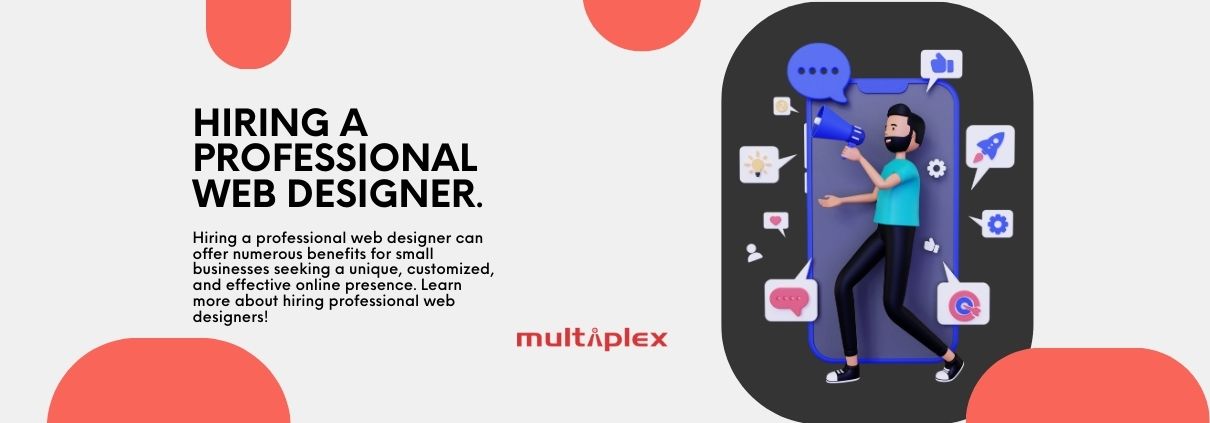Hiring a professional web designer
Introduction:
Hiring a professional web designer can offer numerous benefits for small businesses seeking a unique, customized, and effective online presence. This section will explore the advantages of working with a professional, how to choose the right web design agency or freelancer, essential questions to ask, and what to expect during the web design process.
1. Benefits of Hiring a Professional Web Designer
1.1 Customization and Uniqueness
A professional web designer can create a custom website tailored to your specific business needs, branding, and target audience, resulting in a more unique and memorable online presence.
“Good design is like a refrigerator—when it works, no one notices, but when it doesn’t, it sure stinks.” – Irene Au
1.2 Technical Expertise
Professional web designers possess extensive technical knowledge and experience, ensuring your website is built on a solid foundation, optimized for performance, and compatible with various devices and browsers.
1.3 Access to Latest Trends and Technologies
Web design professionals stay up-to-date with the latest trends, techniques, and technologies, ensuring your website remains modern, functional, and competitive.
1.4 Time and Effort Savings
By outsourcing web design to a professional, small business owners can save time and effort, allowing them to focus on other essential aspects of their business.
2. How to Choose the Right Web Design Agency or Freelancer
2.1 Assess Your Needs
Identify your website’s primary goals, target audience, desired features, and budget constraints to help you select a web designer that aligns with your needs.
2.2 Review Portfolios and Testimonials
Evaluate a web designer’s portfolio and client testimonials to gain insight into their design style, technical expertise, and overall quality of work.
2.3 Consider Communication and Collaboration
Choose a web designer who communicates effectively and is open to collaboration, ensuring your vision and ideas are incorporated into the final design.
2.4 Evaluate Pricing and Value
Compare pricing and services offered by various web designers, considering the overall value they provide and ensuring they fit within your budget.
“Design is not just what it looks like and feels like. Design is how it works.” – Steve Jobs
3. Questions to Ask Before Hiring a Web Designer
3.1 What is your design process?
Understanding a web designer’s process can help you gauge their level of organization, professionalism, and experience.
3.2 What technologies and platforms do you specialize in?
Ensure the web designer is well-versed in the technologies and platforms relevant to your project, such as content management systems, e-commerce platforms, and coding languages.
3.3 Do you offer ongoing website maintenance and support?
Determine whether the web designer provides ongoing maintenance and support services, which can be valuable for addressing technical issues and keeping your website up-to-date.
3.4 Can you provide references or case studies?
Request references or case studies from past clients to gain insight into the web designer’s ability to deliver successful results.
4. What to Expect During the Web Design Process
4.1 Discovery and Planning
The web design process typically begins with a discovery and planning phase, where the designer gathers information about your business, goals, target audience, and desired features to create a project plan.
4.2 Design and Development
The designer will create mockups or wireframes based on your input, allowing you to review and provide feedback before moving on to the development phase. During development, the designer will build and code your website, incorporating the approved design and features.
4.3 Testing and Launch
Once the website is built, the designer will perform extensive testing to ensure it functions correctly, is optimized for performance, and is compatible with various devices and browsers. After addressing any issues, the website will be launched and made public.
4.4 Post-Launch Support and Maintenance
Following the launch, your web designer may provide ongoing support and maintenance services to address any technical issues, implement updates, and ensure your website remains functional and up-to-date.
“A website is a window through which your business says hello to the world.” – Amit Kalantri
5. Website Maintenance Services for Small Businesses
5.1 Regular Updates and Content Management
A professional web designer can help keep your website content fresh and up-to-date, ensuring it remains relevant and engaging for your target audience.
5.2 Performance Optimization
Ongoing performance optimization services can help ensure your website loads quickly, functions smoothly, and maintains a positive user experience.
5.3 Security and Backup
Website maintenance services may include regular security checks, updates, and backups, safeguarding your website from potential threats and data loss.
5.4 Technical Support
Professional web designers can offer technical support, addressing any issues that may arise and providing guidance on website management and best practices.
“Your website should be your calling card, or your business front door.” – James Schramko
In conclusion, hiring a professional web designer can provide numerous benefits for small businesses, including customization, technical expertise, and access to the latest trends and technologies. By carefully selecting a web designer that aligns with your needs, asking essential questions, and understanding the web design process, you can create a unique, effective, and professional website that supports your business goals and engages your target audience.


